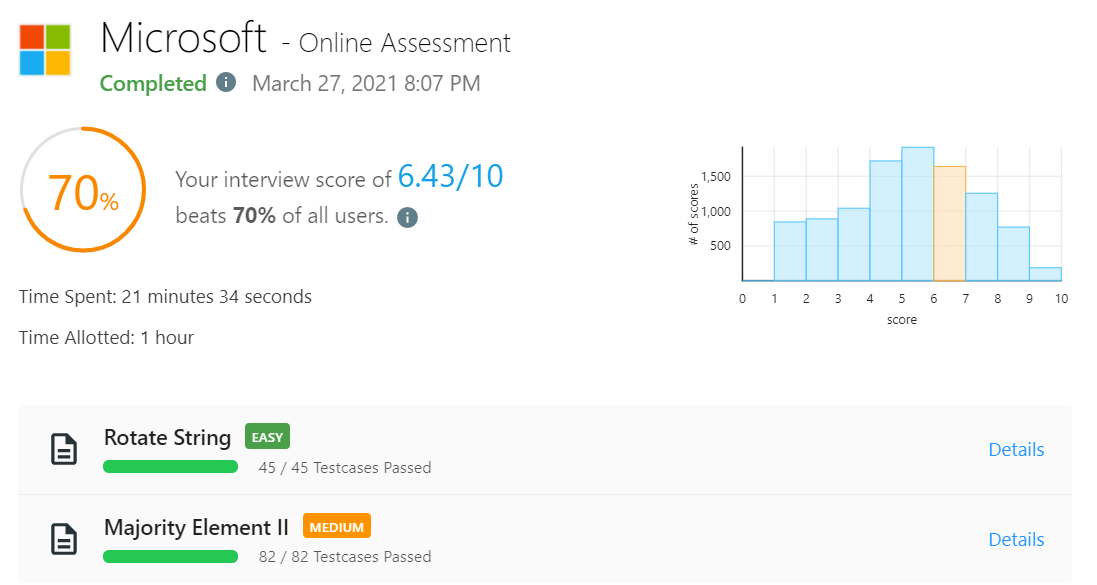
Majority Element II
class Solution {
public List<Integer> majorityElement(int[] nums) {
List<Integer> result = new ArrayList<Integer>();
Map<Integer, Integer> m = new HashMap<Integer, Integer>();
for (int i = 0; i < nums.length; i++) {
m.put(nums[i], m.getOrDefault(nums[i], 0) + 1);
if (m.get(nums[i]) > nums.length / 3) {
result.add(nums[i]);
m.remove(nums[i]);
}
}
return result;
}
}Wrong Answer
80/82 test cases passed
처음에는 맵을 쓰고 없애는 방식을 쓰려고 했으나... 꼼수가 안통했다는점^^
- Storage가 O(1)이 아님
class Solution {
public List<Integer> majorityElement(int[] nums) {
List<Integer> result = new ArrayList<Integer>();
int i = 0;
Arrays.sort(nums);
int cur = nums[0];
int count = 0;
while (i < nums.length) {
cur = nums[i];
while (i < nums.length && nums[i] == cur) {
count++;
i++;
}
if (count > nums.length / 3) {
result.add(cur);
}
count = 0;
}
return result;
}
}Runtime: 5 ms, faster than 41.36% of Java online submissions for Majority Element II.
Memory Usage: 46.3 MB, less than 11.05% of Java online submissions for Majority Element II.
O(1)
여기서 1/3로 한줄만 바꿔주면
while (i < nums.length - nums.length / 3)Runtime: 3 ms, faster than 51.67% of Java online submissions for Majority Element II.
Memory Usage: 46.7 MB, less than 5.11% of Java online submissions for Majority Element II.
조금 올라가네여
+++ 루션이를 본 후기
정말 제가 작아지네요~^^
Boyer-Moore Voting Algorithm
class Solution {
public List < Integer > majorityElement(int[] nums) {
// 1st pass
int count1 = 0;
int count2 = 0;
Integer candidate1 = null;
Integer candidate2 = null;
for (int n: nums) {
if (candidate1 != null && candidate1 == n) {
count1++;
} else if (candidate2 != null && candidate2 == n) {
count2++;
} else if (count1 == 0) {
candidate1 = n;
count1++;
} else if (count2 == 0) {
candidate2 = n;
count2++;
} else {
count1--;
count2--;
}
}
// 2nd pass
List result = new ArrayList <> ();
count1 = 0;
count2 = 0;
for (int n: nums) {
if (candidate1 != null && n == candidate1) count1++;
if (candidate2 != null && n == candidate2) count2++;
}
int n = nums.length;
if (count1 > n/3) result.add(candidate1);
if (count2 > n/3) result.add(candidate2);
return result;
}
}1/3 이상이니깐 candidate이 최대 2개라는 점을 이용해서
만약 top 2 majority와 같은 값이 나온다면 그 값의 count는 올리고, 다른 것은 그대로. 만약 둘 다가 아닌 것이 나온다면 둘 다 1씩 빼고 그러다가 0이 되면 다음 나오는 값으로 대체한다. 끝에 남아있는 2 값을 가지고 이게 진짜 majority가 맞는지 한번 더 확인해서 arraylist에 넣어주면 됨... 진짜 천재 아닌지?
Rotate String
//여러개가 같을 수도 있음...ㅠㅠㅠㅠㅠ
class Solution {
public boolean rotateString(String A, String B) {
if (A.length() == 0 || B.length() == 0) {
return A.equals(B);
}
char start = A.charAt(0);
int diff = 0;
for (int i = 0; i < B.length(); i++) {
if (B.substring(i).equals(A.substring(0, A.length() - i))) {
diff = i;
break;
}
}
String newB = B.substring(diff) + B.substring(0, diff);
return A.equals(newB);
}
}Runtime: 1 ms, faster than 35.17% of Java online submissions for Rotate String.
Memory Usage: 38.8 MB, less than 12.66% of Java online submissions for Rotate String.
뒤쪽에 남은 substring이 같은 지점을 찾아서 앞쪽도 같은지 보는 방식~
+++ 루션이
class Solution {
public boolean rotateString(String A, String B) {
return A.length() == B.length() && (A + A).contains(B);
}
}이게 좀 이해도 가고 제 머리에서 그나마 나올만한 방식 같네요..^^
